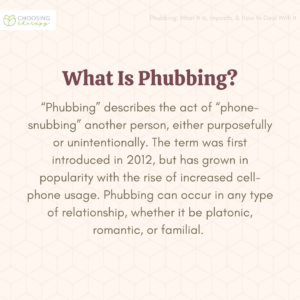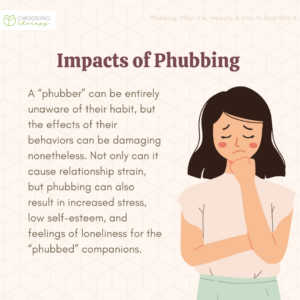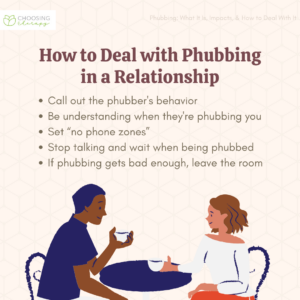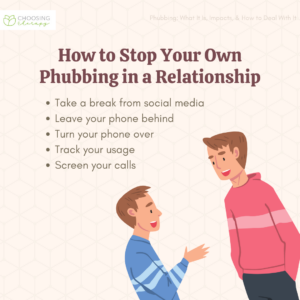Phubbing is the habit of ignoring or snubbing another person in order to focus one’s attention on their cell phone. Unfortunately, this can result in the companion feeling unimportant, cast aside, and frustrated. Phubbing can greatly impact a person’s friendships, romantic relationships, and even their mental health. Recognizing signs of this behavior in yourself is important so you can work towards addressing it.
Do your emotions feel extreme?
Therapy can help you be less reactive and calmer. BetterHelp has over 20,000 licensed therapists who provide convenient and affordable online therapy. BetterHelp starts at $65 per week. Take a Free Online Assessment and get matched with the right therapist for you.
What Is Phubbing?
“Phubbing” describes the act of “phone-snubbing” another person, either purposefully or unintentionally. The term was first introduced by the McCann advertising agency in 2012, but has grown in popularity with the rise of increased cell-phone usage.1 Phubbing can occur in any type of relationship, whether it be platonic, romantic, or familial.
Impacts of Phubbing
Phubbing can negatively impact many different aspects of a person’s life, particularly their relationships with others. For example, think of the last time you were out with friends. Did one of them pull out their phone mid conversation, maybe while you were retelling an important story? How did this behavior make you feel?
A “phubber” can be entirely unaware of their habit, but the effects of their behaviors can be damaging nonetheless. Not only can it cause relationship strain, but phubbing can also result in increased stress, low self-esteem, and feelings of loneliness for the “phubbed” companion’s.
Phubbing & Relationships
The type of relationship in which phubbing is occurring will likely determine the long-lasting impacts of this behavior. For instance, phubbing a partner on a date might be seen as more offensive than doing so with a sibling while out for a family dinner. If a person constantly phubbs a friend, it could be a sign that they are not interested in the friendship–or that they are actually a fake friend. Furthermore, it is not uncommon for one partner in a relationship to use their phone to stonewall another during an argument.
Impacts of phubbing on relationships may include:
- The “phubbed” person feeling left out: A person may start to feel left out if their companion is constantly laughing or giggling at their phone during a conversation. It also gives off the idea that the phubber does not care about their conversation together.2
- It causes frustration: Having to frequently start and stop a conversation because someone is distracted by their phone is annoying and frustrating. This can cause a rift between two people.
- It can lead to resentment: If someone frequently feels ignored when talking or hanging out with a phubber, this can result in feelings of resentment towards the phubber.
- It decreases relationship satisfaction: When a person feels neglected by a phubber, it can impact the level of satisfaction they have about the relationship, whether platonic or romantic.
- It affects a person’s ability to bond to others: Eye contact is important when interacting with another person, as this fosters a mutual connection between one another. Phubbing disrupts this, insinuating that the phubber is not interested in forming a bond with the other person.2
Phubbing & Mental Health
Constant phubbing can make a person feel invalidated in a relationship, which can negatively affect their mental health. Being around a phubber can lower a person’s self-esteem, which can contribute to increased stress and anxiety. To compensate for the phubber’s behavior, many victims turn to their own phones, too. Thus, being phubbed can unintentionally reinforce the cycle of distraction and avoidance.
Impacts of phubbing on a person’s mental health may include:
- Increased feelings of loneliness: Constant phubbing can increase feelings of loneliness, as someone feels that the phubber does not value their relationship.3
- Increased stress levels: Frequently fighting for the attention of another person can increase cortisol levels, thus increasing one’s stress.4
- Low self-esteem: Being the victim of phubbing can lead to low self-esteem, as one begins to feel that the phubber does not have any interest in them as a person.
Top Rated Online Therapy Services
BetterHelp – Best Overall
“BetterHelp is an online therapy platform that quickly connects you with a licensed counselor or therapist and earned 4 out of 5 stars.” Visit BetterHelp
Online-Therapy.com – Great Alternative
In addition to therapy, all Online-Therapy subscriptions include a self-guided CBT course. Visit Online-Therapy.com
How to Tell if You Are a “Phubber”
While some people may be able to recognize phubbing behaviors in themselves immediately, others may be in denial or entirely unaware of their actions. If you notice that you frequently turn to your phone during conversations, you may be a phubber.
Below are signs that you may be a phubber:
- You scroll through social media immediately after sitting down for dinner with a friend.
- You constantly think about checking your phone when someone else is talking.
- You take your phone out constantly in social settings.
- You can’t get through a conversation without checking your phone.
- Instead of screening calls, you always answer the phone when with others.
- You are constantly posting pictures of your meals or drinks during social gatherings.
How to Stop Your Own Phubbing in a Relationship
Understanding your phubbing behavior is the first step towards making change. This habit is not always your fault, as we are constantly surrounded by technology–sometimes, it can feel impossible to escape from it. Nonetheless, it is important to remain present with others to prevent phubbing from impacting your life.
Below are some ways to stop phubbing in your relationships:
Take a Break From Social Media
When addressing phubbing behaviors, taking a break from social media entirely can be beneficial. This can help switch your attention away from doomscrolling to maintaining your relationships. However, you do not need to delete your social media entirely–taking a daily or weekly break is a good place to start.
Leave Your Phone Behind
Choosing to leave your phone behind or out of reach during social outings can be helpful. To make it fair, request that your companion do so as well. If there is concern about being unreachable by family, children, or employers, place your phone inside a purse or backpack.
Turn Your Phone Over
Sometimes, simply turning your phone over when it’s visible can help stop you from phubbing. Doing so can decrease your impulse to look at your phone, which shows your companion that you are interested in them and the conversation.
Track Your Usage
There are many applications that allow you to track your daily or weekly phone usage. This way, you have a data-backed report of how much you are actually on your phone, which can be eye opening for some. Thus, you can take the necessary steps towards decreasing your phone use and work towards becoming more present.
Screen Your Calls
If your phone is ringing, you don’t necessarily need to pick it up right away. You can avoid phubbing someone by only answering a call that requires your immediate attention. If you do need to take a call, let your companion know before doing so.
How to Deal With Phubbing in a Relationship
Being phubbed can be incredibly frustrating. If you are rarely the victim of phubbing, it may be easier to overlook it in a friend or partner–anyone can be a phubber at some point. However, if you are noticing that this is a frequent occurrence in your relationships, there are steps you can take to deal with it.
Below are some ways to deal with phubbing in your relationships:
Call Out the Behavior
Depending on the nature of your relationship, being direct about the phubbing can prove beneficial. Sometimes, people are unintentionally phubbing and receptive to being redirected when their behavior is brought to their attention. When calling out someone’s phubbing behavior, it is important to do this nicely. Start by gently pointing it out by saying, “you seem distracted.”
Be Understanding
Try to stay understanding and empathetic when dealing with phubbing in a relationship. A phubber is usually not behaving this way to be rude, and will likely be open to hearing how you feel. If you are dating or with someone who has a social anxiety disorder, they may engage in phubbing often when in a group setting. If so, try to put yourself in their shoes, rather than become upset. You can then discuss the behaviors when the two of you are alone.
Set “No Phone Zones”
The overuse of social media can affect relationships in negative ways, especially if it is contributing to arguments or affecting the amount of quality time spent together. Setting “no phone zones”, such as at the dinner table or in the bedroom, can help reinforce the importance of your partnership.
Stop Talking & Wait When Being Phubbed
When you are in the middle of a conversation and your partner is looking intently at their phone, simply stop talking. This may get them to revert their attention back to you when you can then alert them of their behavior.
If Phubbing Gets Bad Enough, Leave the Room
In instances where you are being outright ignored–such as in the case of stonewalling–or have already tried to redirect a person’s attention, it is sometimes best to remove yourself from the situation. Separating yourself in this way allows you to revisit the situation later on, and calmly talk about a way to decrease the phubber’s behavior.
When Therapy Can Help
Because social media and mental health are closely related, it’s helpful to pay attention to how you feel while using online platforms–as well as how much they increase your phone usage. If you or someone you love seems unable to put down the phone, this might be a sign that they need therapy for a phone or social media addiction.
If you are considering therapy, there are many options available to you. Online therapy options can be especially beneficial if you have a busy schedule or live in an area that lacks mental health resources. Additionally, couples or marriage counseling can help you and a partner develop and improve your communication skills.
In My Experience
In my experience, phubbing can lead to feelings of resentment and frustration, especially if not addressed appropriately. Taking steps to confront the issue will help, but only if the other person is open to feedback and willing to change the behavior. Using phubbing as a way to dismiss, ignore, or stonewall another person is never okay. If this happens often in a romantic relationship, encouraging your partner to seek therapy or attending sessions together is essential for combating the behavior. Luckily, there are ways to deal with phubbing that will help all parties feel understood and supported.
Additional Resources
To help our readers take the next step in their mental health journey, Choosing Therapy has partnered with leaders in mental health and wellness. Choosing Therapy is compensated for marketing by the companies included below.
Online Therapy
BetterHelp Get support and guidance from a licensed therapist. BetterHelp has over 20,000 therapists who provide convenient and affordable online therapy. Complete a brief questionnaire and get matched with the right therapist for you. Get Started
Online Psychiatry
Hims / Hers If you’re living with anxiety or depression, finding the right medication match may make all the difference. Connect with a licensed healthcare provider in just 12 – 48 hours. Explore FDA-approved treatment options and get free shipping, if prescribed. No insurance required. Get Started
Reduce Drinking
Sunnyside Want to drink less? Sunnyside helps you ease into mindful drinking at your own pace. Think lifestyle change, not a fad diet. Develop new daily routines, so you maintain your new habits for life. Take a 3 Minute Quiz
Mental Health Newsletter
A free newsletter from Choosing Therapy for those interested in mental health issues and fighting the stigma. Get helpful tips and the latest information. Sign Up
Find a therapist for relationship issues
Get the help you need from a therapist near you
City or zip Search








